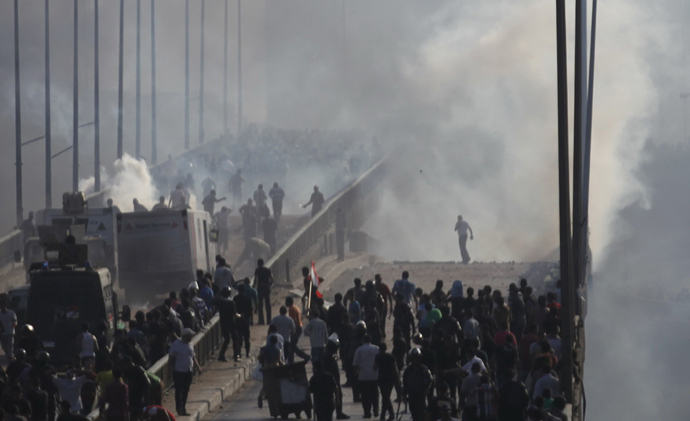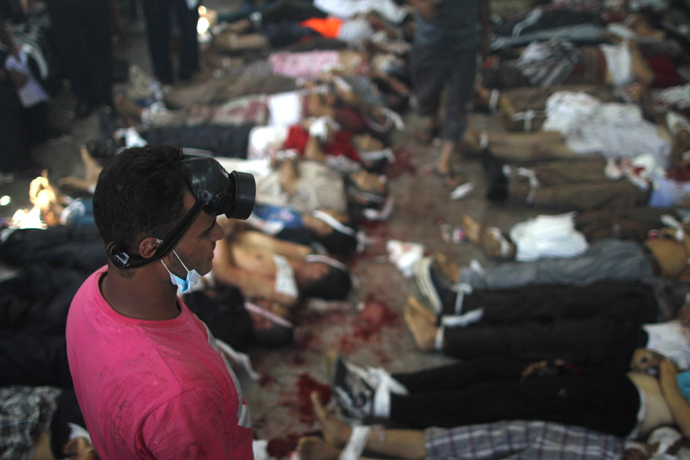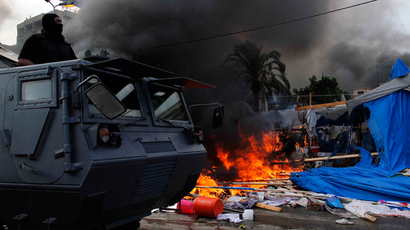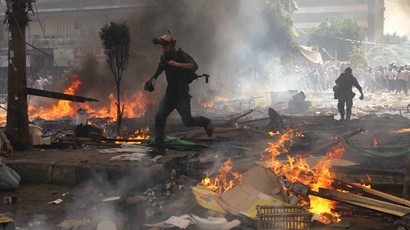Bloody reckoning: Crisis-torn Egypt’s future on a knife edge after crackdown on Islamists
The Egyptian military’s crackdown on supporters of ex-President Mohamed Morsi has plunged the world’s most populous Arab nation into its worst violence for decades. The country is teetering between a return to Mubarak-era autocracy and civil war.
Read RT's live updates on the situation in Egypt.
Egyptian security forces interrupted a six-week-long stand-off with Morsi’s Muslim Brotherhood on Wednesday, launching a crackdown on two sit-in camps in Cairo. The troops used armored bulldozers, tear gas and bird shot to level and burn down tent camps, where people demanding Morsi’s reinstatement as president were staging a round-the-clock protest.
In the ensuing clashes, which spread from Cairo to other towns and cities across the country, at least 638 people were killed and 3,994 injured, according to a tally on Thursday by the Egyptian Health Ministry. About two-fifths of the protesters killed were in Rabaa al-Adawiya Square, where the biggest Muslim Brotherhood sit-in was located.
The opposition claims that the number of casualties was much higher, with a Muslim Brotherhood spokesman saying more than 4,500 people have been killed in what he described as a “massacre.”
We will always b non-violent & peaceful. We remain strong, defiant & resolved. We will push fwd untill w. bring down this #Military_Coup
— Gehad El-Haddad (@gelhaddad) August 15, 2013
At least 43 people of those killed were security troops, indicating the intensity of violence that both sides resorted to. The Egyptian police and Morsi supporters accused each other of using firearms in the clashes, with state media showing home-made firearms and ammunition confiscated by the police at the protest camps.
Muslim Brotherhood supporters continued to hold protest marches, in defiance of the government’s crackdown and the state of emergency they were attempting to enforce.
Hundreds of Morsi supporters stormed the Giza Governorate
and set it ablaze on, along with a nearby four-story
administrative building. While nobody was inside the more
imposing colonial-style governorate, people had to be evacuated
from the top floors of the second building as thick clouds of
smoke threateningly billowed around them.
The Interior Ministry stated mere hours after the attacks that
live ammunition will be used to repulse any attack on public
buildings or security forces.
Further unrest was witnessed in Egypt's second-largest city,
Alexandria, when hundreds of demonstrators took to the streets,
chanting “We will come back again for the sake of our
martyrs.” At least three people were killed and 55 others
injured when Muslim Brotherhood supporters clashed with local
residents at the rally in Alexandria, reported Al Arabiya.
Later in the day, US President Barack Obama announced that joint
US-Egypt military drills which had been scheduled to take place
next month are being called off in the wake of the violence.
Wednesday’s violence also saw the deaths of four journalists, including Mick Deane, a 61-year-old Sky News cameraman. Fatalities among media professionals, who usually wear clothing and equipment identifying them as journalists, are rare in countries not engaged in warfare.
I've never seen such a bloody fight in Egypt.The security forces kept us ducking behind cars,under a barrage of bullets for 8 hours straight
— Bel Trew - بل ترو (@Beltrew) August 14, 2013
The crackdown on the protesters included arrests of several Muslim Brotherhood leaders. Security officials claimed that Brotherhood leaders were instructing their followers to attack police stations in the country. In the wake of the day of clashes, the government announced a month-long state of emergency and a dusk-to-dawn curfew.
The violence also had a clear religious angle to it, when Morsi supporters targeted at least three Coptic Christian churches in towns of Minya, Sohag and Assiut. Coptic Christians, who comprise some 10 percent of Egypt’s population of 84 million, have complained that the rise of the Brotherhood after the toppling of longtime President Hosni Mubarak led to increased persecution of Egypt’s Christians. Many Coptic Christians welcomed last month’s military coup that deposed Morsi.
The clashes increased the strain on Egypt’s interim government, with liberal Vice President Mohamed ElBaradei resigning Wednesday evening in protest against the military crackdown.
"It has become difficult for me to continue bearing responsibility for decisions that I do not agree with and whose consequences I fear. I cannot bear the responsibility for one drop of blood," ElBaradei said in his resignation letter to the country’s interim president.
Other liberal members of the interim government did not follow ElBaradei’s lead, but his departure from the administration cast doubt over the prospects of the armed forces being able to form an inclusive and efficient government.
The military seem determined to continue their hard-fisted treatment of the Muslim Brotherhood. Interior Minister Mohamed Ibrahim vowed to restore Mubarak-era security to the country.
"I promise that as soon as conditions stabilize and the
Egyptian street stabilizes, as soon as possible, security will be
restored to this nation as if it was before January 25, and
more," he said in a reference to January 25, 2011, the day
when the huge demonstrations began that led to Mubarak’s
downfall.
Since the 2011 revolution,
Egypt’s security and already-weak economy have been gradually
deteriorating as the country descends into intensified power
struggles and weak governance. Under the rule of Mubarak, the
Muslim Brotherhood remained illegal, due to its past alleged
involvement in political assassinations.

The military’s apparent wish to return to Mubarak-style rule indicates that the generals have failed to appreciate the changes in Egyptian society that have occurred since the ousting of the long-time leader in 2011, journalist and author Hugh Miles told RT.
“Islamism has become extremely popular, and what we’re really seeing now in Egypt is a clash between people who want Islam as their frame of reference, against people who want a more secular kind of European-style frame of reference,” Miles told RT. “And that’s a very fundamental divide. It divides families and it divides Egypt. Probably, roughly half-and-half is the best guess.”
After Wednesday’s violence, several international organizations and countries, including the US, criticized the Egyptian military for the violent crackdown on the Muslim Brotherhood. US Secretary of State John Kerry described the events as “deplorable,” a word seldom used by diplomats.
Washington reportedly has threatened to cancel its main annual joint military exercise with Egypt, which has been a symbol of US support of the Egyptian military since the signing of the Camp David peace accords between Egypt and Israel in 1978. The US provides some $1.3 billion in military aid and about $250 million in economic aid a year to Egypt. Some observers say this aid could be used to put pressure on the current Egyptian leadership to moderate its authoritarian rule.

Some Egypt-watchers believe that the US is reluctant to use its financial leverage, however, due to a fear of antagonizing the Muslim country and compromising the security of its neighbor, Israel. The strain in relations was clear in the most recent US attempt to mediate in the ongoing crisis, when Senators John McCain and Lindsey Graham last week pleaded with the Egyptian military to reinstate Morsi, only to receive a sharp rebuff.
“Egypt's new military regime and a sizable and vocal portion of the Egyptian population have made it very clear that they just want the United States to leave it alone,” political analyst Marc Lynch argued in the online magazine Foreign Policy. “For once, Washington should give them their wish. As long as Egypt remains on its current path, the Obama administration should suspend all aid, keep the embassy in Cairo closed, and refrain from treating the military regime as a legitimate government.”
Egypt’s government finances are currently running low, so Cairo to a large degree relies on international aid and loans to provide even basic commodities like wheat and fuel. Critics of Morsi say during his year as president he was more interested in sidelining the secular opposition than in carrying out much-needed reforms.
The strongest international condemnation of Wednesday’s crackdown came from Turkey, whose moderate Islamist government has been a firm supporter of the Egyptian branch of the Muslim Brotherhood. Ankara called on the UN Security Council and the Arab League to stop the “massacre.” Several other countries in the region, including Iran, Tunisia, the Arab Emirates and Qatar, also criticized the crackdown.















